大数据英语
大数据英语翻译

大数据英语翻译1. 大数据的英语翻译是"big data"。
"big data" 是指处理和分析庞大、复杂数据集的技术和方法。
2. "big data" 是由两个单词组成的短语。
"big" 意味着数据集非常庞大,通常无法通过传统的数据处理方法来处理和分析。
而"data" 指的是收集到的各种类型的信息。
3. 大数据是在现代技术快速发展的背景下出现的。
随着互联网、传感器技术、社交媒体等信息源的爆炸性增长,我们能够收集到大量的数据,这些数据对于解决问题和做出决策具有重要意义。
4. 大数据的特点是三个"V":体量(Volume)、速度(Velocity)和多样性(Variety)。
体量指的是数据集非常庞大,数量级通常是以千、百万、甚至十亿计。
速度指的是数据的产生和流动的速度非常快,需要实时或近实时地进行处理和分析。
多样性指的是数据的类型和格式多种多样,包括结构化数据(如数据库中的表格)、半结构化数据(如XML或JSON文件)和非结构化数据(如文本、图像、视频等)。
5. 大数据的应用范围非常广泛。
在商业领域,大数据可以用于市场调研、客户分析、销售预测等。
在医疗领域,大数据可以用于研究疾病模式、个性化医疗等。
在城市规划领域,大数据可以用于交通管理、环境保护等。
在科学研究领域,大数据可以用于天文学、生物学等。
6. 大数据的处理和分析需要借助于先进的技术和工具。
其中,数据采集、数据存储、数据处理和数据可视化是关键的环节。
数据采集可以通过传感器、网络爬虫、调查问卷等方式获取数据。
数据存储可以使用分布式文件系统(如Hadoop)、关系型数据库、NoSQL数据库等技术。
数据处理可以使用分布式计算、机器学习、统计分析等方法。
数据可视化可以使用图表、地图、仪表盘等方式将数据展示出来。
7. 大数据的发展也带来了一些挑战和问题。
六下英语大数据第二单元的作文
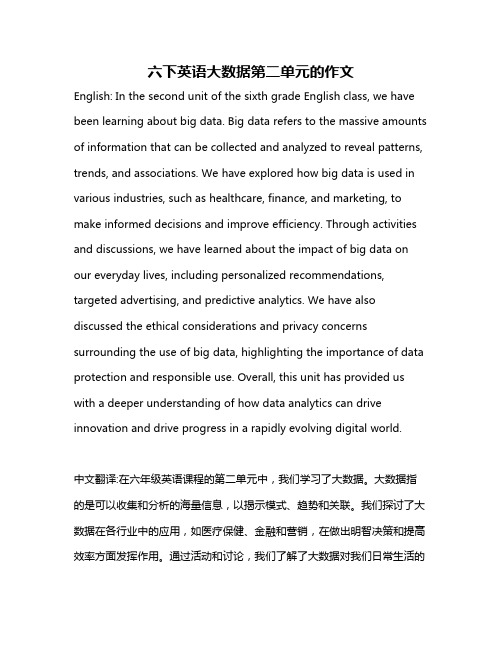
六下英语大数据第二单元的作文English: In the second unit of the sixth grade English class, we have been learning about big data. Big data refers to the massive amounts of information that can be collected and analyzed to reveal patterns, trends, and associations. We have explored how big data is used in various industries, such as healthcare, finance, and marketing, to make informed decisions and improve efficiency. Through activities and discussions, we have learned about the impact of big data on our everyday lives, including personalized recommendations, targeted advertising, and predictive analytics. We have also discussed the ethical considerations and privacy concerns surrounding the use of big data, highlighting the importance of data protection and responsible use. Overall, this unit has provided us with a deeper understanding of how data analytics can drive innovation and drive progress in a rapidly evolving digital world.中文翻译:在六年级英语课程的第二单元中,我们学习了大数据。
大数据技术的作文英语
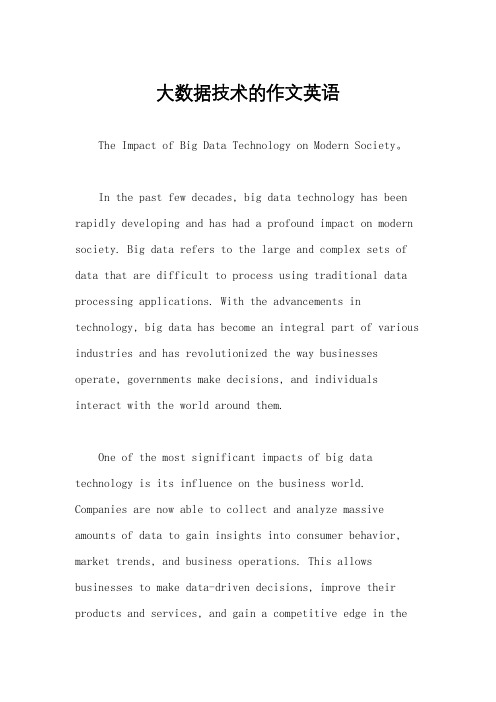
大数据技术的作文英语The Impact of Big Data Technology on Modern Society。
In the past few decades, big data technology has been rapidly developing and has had a profound impact on modern society. Big data refers to the large and complex sets of data that are difficult to process using traditional data processing applications. With the advancements in technology, big data has become an integral part of various industries and has revolutionized the way businesses operate, governments make decisions, and individuals interact with the world around them.One of the most significant impacts of big data technology is its influence on the business world. Companies are now able to collect and analyze massive amounts of data to gain insights into consumer behavior, market trends, and business operations. This allows businesses to make data-driven decisions, improve their products and services, and gain a competitive edge in themarket. For example, e-commerce companies like Amazon and Alibaba use big data technology to personalize product recommendations for their customers, leading to higher sales and customer satisfaction.Furthermore, big data technology has also transformed the healthcare industry. With the ability to analyze large volumes of medical data, healthcare providers can now improve patient care, diagnose diseases more accurately, and develop personalized treatment plans. For instance, big data analytics have been used to identify patterns in patient data to predict and prevent diseases, ultimately saving lives and reducing healthcare costs.In addition, big data technology has had a significant impact on government and public policy. Governments can now use big data analytics to improve public services, optimize resource allocation, and enhance decision-making processes. For example, city planners can analyze traffic patterns and public transportation data to improve urban mobility and reduce congestion. Moreover, big data technology has also been used to analyze social media data to monitor publicsentiment and identify potential security threats.On a personal level, big data technology has changed the way individuals interact with the world. Social media platforms and online services use big data analytics to personalize content and advertisements based on users' preferences and behavior. This has led to a more personalized and tailored online experience for users, but has also raised concerns about privacy and data security.Despite its numerous benefits, big data technology also poses challenges and risks. The collection and analysis of large amounts of data raise concerns about privacy, security, and ethical implications. There is also the potential for data breaches and misuse of personal information, which can have serious consequences for individuals and organizations.In conclusion, big data technology has had a profound impact on modern society, revolutionizing the way businesses operate, governments make decisions, and individuals interact with the world. While it offersnumerous benefits and opportunities, it also poses challenges and risks that need to be addressed. As big data technology continues to evolve, it is crucial for society to find a balance between harnessing its potential and mitigating its negative impacts. Only then can we fully realize the benefits of big data technology while safeguarding the privacy and security of individuals.。
对大数据的看法英语作文

对大数据的看法英语作文(中英文实用版)**English Composition: Views on Big Data**Big data has become an integral part of our modern society, shaping industries, governments, and our daily lives.It refers to the vast amount of data generated from various sources, which, when analyzed, can provide valuable insights and predictions.My view on big data is multifaceted, recognizing both its benefits and challenges.Firstly, the positive impact of big data is undeniable.It has revolutionized decision-making processes by providing real-time and accurate information.Businesses can now tailor their products and services to customer preferences, thus enhancing customer satisfaction and loyalty.In the realm of healthcare, big data analysis contributes to personalized medicine and more effective treatments.Moreover, big data"s predictive capabilities are invaluable in urban planning, environmental protection, and disaster management.However, the rise of big data also presents challenges.Privacy concerns top the list, as the collection and analysis of personal data can infringe on individual privacy rights.There is also a risk of data manipulation and bias, which can lead to skewed conclusions and unethical decision-making.Additionally, the storage and processing requirements of big data can have a significant environmental impact dueto the energy consumption of data centers.In conclusion, big data is a double-edged sword.Its potential for positive transformation is immense, but it must be wielded responsibly.Striking a balance between utilizing the benefits of big data and protecting individual rights and ethical standards is crucial as we continue to navigate the data-driven era.**中文作文:对大数据的看法**大数据已经成为现代社会的一个重要组成部分,它影响着工业、政府以及我们的日常生活。
有关大数据的英语作文
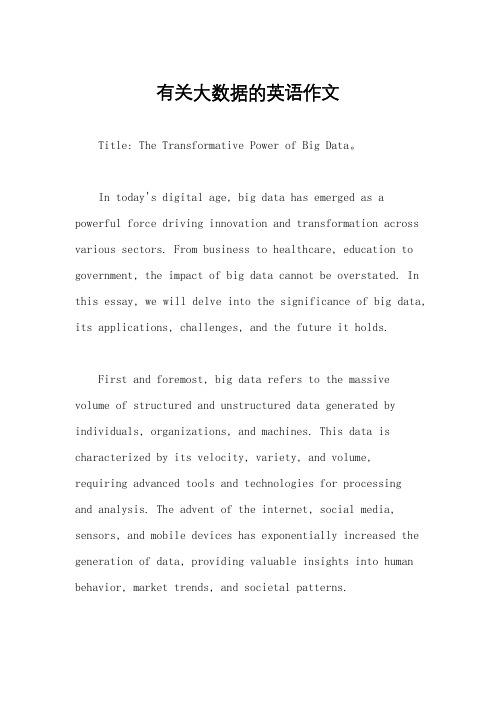
有关大数据的英语作文Title: The Transformative Power of Big Data。
In today's digital age, big data has emerged as a powerful force driving innovation and transformation across various sectors. From business to healthcare, education to government, the impact of big data cannot be overstated. In this essay, we will delve into the significance of big data, its applications, challenges, and the future it holds.First and foremost, big data refers to the massive volume of structured and unstructured data generated by individuals, organizations, and machines. This data is characterized by its velocity, variety, and volume,requiring advanced tools and technologies for processingand analysis. The advent of the internet, social media, sensors, and mobile devices has exponentially increased the generation of data, providing valuable insights into human behavior, market trends, and societal patterns.One of the most prominent applications of big data isin the realm of business and commerce. Companies leverage big data analytics to gain a competitive edge, enhance customer experience, and drive operational efficiency. By analyzing consumer preferences, purchase history, and online behavior, businesses can tailor their marketing strategies, personalize products, and optimize supply chain management. For instance, e-commerce giants like Amazon use big data algorithms to recommend products based on past purchases and browsing history, thereby increasing sales and customer satisfaction.Furthermore, big data plays a crucial role in revolutionizing healthcare delivery and patient outcomes. Healthcare providers utilize data analytics to improve diagnosis accuracy, identify disease outbreaks, and personalize treatment plans. Electronic health records (EHRs) enable the seamless exchange of patient information, facilitating collaboration among healthcare professionals and reducing medical errors. Moreover, wearable devices and health monitoring apps collect real-time data onindividuals' vital signs, allowing for early detection ofhealth issues and proactive interventions.In addition to business and healthcare, big data has significant implications for education, government, and urban planning. Educational institutions analyze student performance data to identify learning gaps, personalize instruction, and measure academic progress. Governments use big data to enhance public services, optimize resource allocation, and address urban challenges such as traffic congestion and air pollution. Smart cities leverage IoT sensors and data analytics to improve infrastructure efficiency, promote sustainability, and enhance citizens' quality of life.Despite its numerous benefits, big data also presents several challenges and concerns, particularly regarding privacy, security, and ethical considerations. The collection and analysis of vast amounts of personal data raise concerns about data privacy and consent. Unauthorized access, data breaches, and cyber-attacks pose significant risks to data security, jeopardizing individuals' sensitive information and organizational integrity. Moreover, the useof big data algorithms in decision-making processes raises ethical questions regarding bias, fairness, and accountability.Looking ahead, the future of big data holds immense potential for further innovation and societal impact. Advancements in artificial intelligence, machine learning, and predictive analytics will enable more sophisticated data-driven solutions across various domains. Moreover, the proliferation of edge computing and 5G technology will facilitate real-time data processing and analysis, empowering organizations to make faster, data-driven decisions. However, addressing the ethical, legal, and social implications of big data remains paramount to ensure its responsible and equitable use.In conclusion, big data has become a cornerstone of the digital revolution, driving innovation, efficiency, and transformation across sectors. From business optimization to healthcare delivery, the applications of big data are vast and multifaceted. However, its widespread adoption also presents challenges and concerns that must beaddressed to harness its full potential responsibly. As we continue to navigate the ever-expanding landscape of big data, it is essential to strike a balance between innovation and ethics, ensuring that data-driven technologies serve the greater good of society.。
大数据技术的作文英语
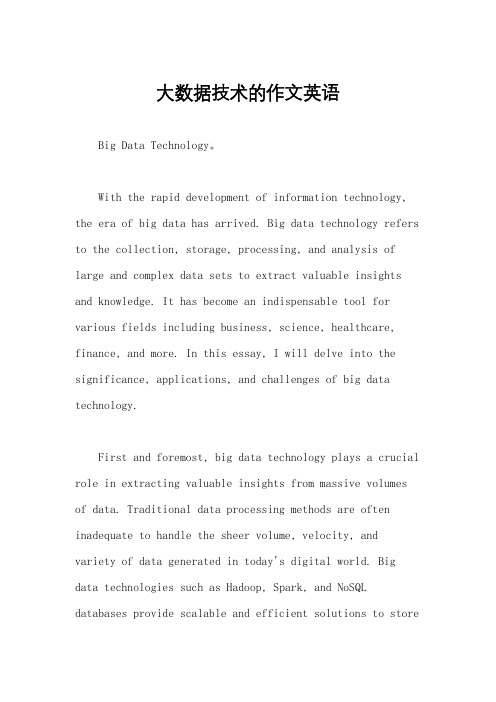
大数据技术的作文英语Big Data Technology。
With the rapid development of information technology, the era of big data has arrived. Big data technology refers to the collection, storage, processing, and analysis of large and complex data sets to extract valuable insights and knowledge. It has become an indispensable tool for various fields including business, science, healthcare, finance, and more. In this essay, I will delve into the significance, applications, and challenges of big data technology.First and foremost, big data technology plays a crucial role in extracting valuable insights from massive volumes of data. Traditional data processing methods are often inadequate to handle the sheer volume, velocity, andvariety of data generated in today's digital world. Big data technologies such as Hadoop, Spark, and NoSQL databases provide scalable and efficient solutions to storeand process vast amounts of data. These technologies enable organizations to gain deeper insights into customer behavior, market trends, and operational efficiency.One of the significant applications of big data technology is in business and marketing. Companies can analyze customer data to understand their preferences, purchasing behavior, and sentiment towards products or services. This enables personalized marketing campaigns, targeted advertising, and product recommendations, leading to better customer engagement and increased sales. For example, e-commerce giant Amazon utilizes big dataanalytics to recommend products based on users' browsing and purchasing history, resulting in a significant increase in sales revenue.Moreover, big data technology has revolutionized healthcare by facilitating data-driven decision-making and personalized medicine. Healthcare providers can analyze electronic health records, medical imaging, and genomic data to identify patterns, diagnose diseases, and recommend personalized treatment plans. This leads to better patientoutcomes, reduced healthcare costs, and improved population health management. For instance, IBM's Watson Health platform leverages big data analytics to assist healthcare professionals in diagnosing and treating cancer patients more effectively.Furthermore, big data technology has immense potential in scientific research and discovery. Scientists can analyze large datasets generated from experiments, simulations, and observations to uncover new insights and knowledge across various disciplines. This includes areas such as climate modeling, genomics, particle physics, and astronomy. For example, the Large Hadron Collider (LHC) generates petabytes of data from particle collisions, which are analyzed using big data techniques to discover new particles and understand the fundamental laws of physics.Despite its numerous benefits, big data technology also poses several challenges. One of the primary challenges is data privacy and security. As large volumes of sensitive data are collected and stored, there is a risk of data breaches, unauthorized access, and misuse of personalinformation. Ensuring data privacy and compliance with regulations such as GDPR (General Data Protection Regulation) and HIPAA (Health Insurance Portability and Accountability Act) is crucial to maintain trust and integrity in the use of big data.Another challenge is the need for skilled professionals proficient in big data technologies and data analytics. There is a growing demand for data scientists, data engineers, and data analysts who can manage and analyze large datasets effectively. However, there is a shortage of talent with the necessary skills and expertise, leading to a competitive job market and recruitment challenges for organizations.In conclusion, big data technology has revolutionized the way we collect, store, process, and analyze data, enabling unprecedented insights and opportunities across various industries. From business and marketing to healthcare and scientific research, big data technology has transformed the way we make decisions, innovate, and solve complex problems. However, it also poses challenges such asdata privacy, security, and skills shortage. Addressing these challenges will be crucial in harnessing the full potential of big data technology for the benefit of society.。
大数据英语PPT演示课件

The early years of data revolution:
challenges
challenges
Data
privacy access and sharing
Analysis
“what is the data really telling us?”
summarizing the data interpreting defining and detecting anomalties
Data revolution
today a massive amount of data is regularly being generated and flowing from various sources, through different channels, every minute in today’s Digital Age.
fig. New types of research data about human behavior and society pose many opportunities if crucial infrastructural challenges are tackled.
Part 5 conclusion
Characteristics:
Volume : data size Velocity :speed of change Variety : different forms of data sources
application
application
Bank transactions
1.3 million transactions in 2015 worldwide;
大数据英语翻译
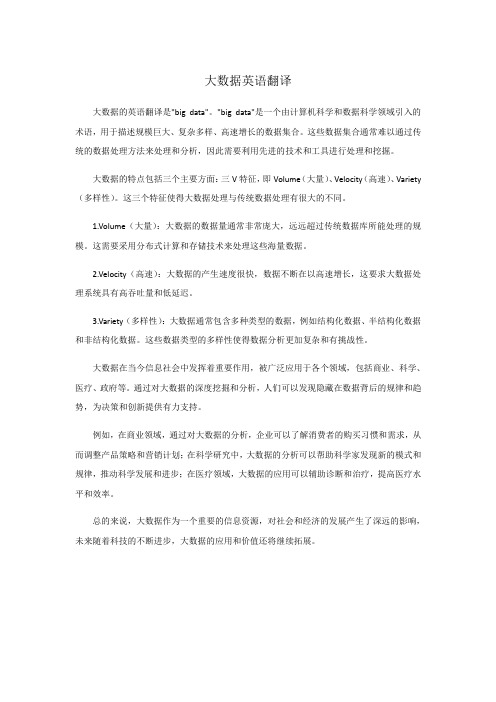
大数据英语翻译大数据的英语翻译是"big data"。
"big data"是一个由计算机科学和数据科学领域引入的术语,用于描述规模巨大、复杂多样、高速增长的数据集合。
这些数据集合通常难以通过传统的数据处理方法来处理和分析,因此需要利用先进的技术和工具进行处理和挖掘。
大数据的特点包括三个主要方面:三V特征,即Volume(大量)、Velocity(高速)、Variety (多样性)。
这三个特征使得大数据处理与传统数据处理有很大的不同。
1.Volume(大量):大数据的数据量通常非常庞大,远远超过传统数据库所能处理的规模。
这需要采用分布式计算和存储技术来处理这些海量数据。
2.Velocity(高速):大数据的产生速度很快,数据不断在以高速增长,这要求大数据处理系统具有高吞吐量和低延迟。
3.Variety(多样性):大数据通常包含多种类型的数据,例如结构化数据、半结构化数据和非结构化数据。
这些数据类型的多样性使得数据分析更加复杂和有挑战性。
大数据在当今信息社会中发挥着重要作用,被广泛应用于各个领域,包括商业、科学、医疗、政府等。
通过对大数据的深度挖掘和分析,人们可以发现隐藏在数据背后的规律和趋势,为决策和创新提供有力支持。
例如,在商业领域,通过对大数据的分析,企业可以了解消费者的购买习惯和需求,从而调整产品策略和营销计划;在科学研究中,大数据的分析可以帮助科学家发现新的模式和规律,推动科学发展和进步;在医疗领域,大数据的应用可以辅助诊断和治疗,提高医疗水平和效率。
总的来说,大数据作为一个重要的信息资源,对社会和经济的发展产生了深远的影响,未来随着科技的不断进步,大数据的应用和价值还将继续拓展。
- 1、下载文档前请自行甄别文档内容的完整性,平台不提供额外的编辑、内容补充、找答案等附加服务。
- 2、"仅部分预览"的文档,不可在线预览部分如存在完整性等问题,可反馈申请退款(可完整预览的文档不适用该条件!)。
- 3、如文档侵犯您的权益,请联系客服反馈,我们会尽快为您处理(人工客服工作时间:9:00-18:30)。
Taobao search
definition
definition
Big data is the need for new processing mode to have a stronger decision-making power, insight into the ability to find and process optimization to adapt to the massive, high growth rate and diversification of information assets.
fig. New types of research data about human behavior and society pose many opportunities if crucial infrastructural challenges are tackllusion
Today data require scientific and computational intelligence. Big Data Future is a free, public, multidisciplinary conference on
the possibilities for new enterprises grounded in “big data” to improve economic, social, and political life. What is needed is both intent and capacity to be sustained and strengthened, on the basis of a full recognition of the opportunities and challenges.
Characteristics:
Volume : data size Velocity :speed of change Variety : different forms of data sources
application
application
Bank transactions
1.3 million transactions in 2015 worldwide;
Medical treatment
Electronic health record
E-commerce
Taobao Amazon
transportationf traffic
The current traffic flow data and historical data from road traffic system acquisition equipment acquired (types of data resources, after numerous) centralized, unified management, deep processing, to achieve the flow of dynamic, real-time and accurate traffic prediction and judgment, so as to realize the real-time traffic flow data sharing to improve city road traffic congestion problem.
The early years of data revolution:
challenges
challenges
Data
privacy access and sharing
Analysis
“what is the data really telling us?”
summarizing the data interpreting defining and detecting anomalies
Now: available digital data:150 EB(Exabyte)(2005) 1200 EB(2010)
Predicted: the stock of digital data is expected to increase 44 times between 2007 and 2020, doubling every 20 months.
opportunities
opportunities
Data revolution
today a massive amount of data is regularly being generated and flowing from various sources, through different channels, every minute in today’s Digital Age.
Thank you
